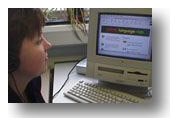

 |
 |
If you've already read this page, then you probably need the:
|
|
Time to get organised!
To learn the language and to gain credit, you will need to be methodical, patient and adventurous. You will need to listen many times to the spoken language and most importantly, you will need to be brave enough to speak it out loud.
As well as speaking and listening it will help you to examine the words carefully on paper and to consider the way they work together - grammar! After this you can unwind with some word puzzles.
To help you get organised we have answered the following imagined questions:
What are the learning sessions?
The course is divided into the same twelve episodes as the story. For each episode there are ten tasks as follows:
What should I do and in what order?
We suggest you first complete tasks 1-6 for each scene (on average about four scenes for each episode).
You can do these tasks in any order you like, but it would be easier to follow tasks 1-6 in order, because they are increasingly difficult - at first you are just listening, later you have to reproduce the language yourself. These tasks require you to download some interactive software and movies to work offline in your own time and at your own pace.
Tasks 7-9 apply to the whole episode and ask you to investigate the nuts and bolts of the language. They mostly involve work on paper - pages you have printed from this web site.
Then, after all your hard work, you can finish off with a fun activity in task 10!
How long will it take?
The course should take about 80 hours. We recommend that you set aside at least 4 hours a week. You should then finish in about four months. If you have more time available then of course you can finish more quickly.
The tasks for one episode (as above) should take between 6-8 hours to complete.
Plan to study for 1-2 hours per session, but take a break every half an hour, if only to stand up, walk around and make a cup of tea! Make sure everything is to hand before starting and ring the changes with different activities to keep your interest going.
What preparations can I make for each learning session?
Each task contains a brief to help you prepare and tells you:
- what to download;
- what to print;
- what to do with the interactive software;
- what purpose each task has;
- how to benefit from the task and keep going.
In addition there is a debrief to help you decide how successful you have been and to point you towards the next task.
How will I chart my progress?
For each episode there is a task planner - it is for you to use to plan your work and use as a record of progress by:
- entering dates and times when you expect to work on each task;
- noting when you finish each task;
- reporting any problems or successes.
Print out the task planner pages and keep them in a well organised folder or ring-binder with the other print-outs you make.